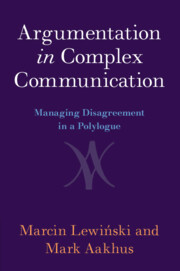Refine search
Actions for selected content:
2 results

Argumentation in Complex Communication
- Managing Disagreement in a Polylogue
-
- Published online:
- 22 February 2023
- Print publication:
- 22 December 2022
Chapter 6 - Normative Evaluation of Polylogues
- from Part II - Analyzing, Evaluating, and Designing Polylogue
-
- Book:
- Argumentation in Complex Communication
- Published online:
- 22 February 2023
- Print publication:
- 22 December 2022, pp 161-197
-
- Chapter
- Export citation
